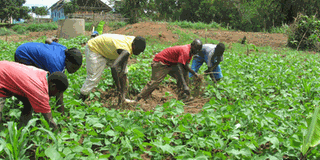Farmers to benefit from grants

Bean farmers will also benefit from the new programme. PHOTO BY MICHEAL J. SSALI
A new programme that provides grants to bio-scientists working to improve food production and environmental management in Eastern Africa was launched on March 16, 2011 at the Nairobi headquarters of the International Livestock Research Institute (ILRI).
According to a press release from Nairobi, the newly established Bio-resources Innovation Network for Eastern Africa Development (Bio-Innovate) Programme provides competitive grants to African researchers.
The grants are meant for researchers who are working with the private sector and non-governmental organisations to find ways of improving food security, boost resilience to climate change and identify environmentally sustainable ways of producing food.
In its first three-year-phase, the programme is supporting five research-based projects working to improve the productivity of sorghum, millet, cassava, sweet potato, and bean farmers. It also helps farmers to adapt to climate change; to improve the processing of wastes in the production of sisal and coffee and to better treat waste water generated in leather processing and slaughter house operations.
In a second call for proposals, beginning June 2011, Bio-Innovate will help build agricultural commodity “value chains” in the region and a supportive policy environment for bio-resource innovations.
The five-year-programme is funded by a $12m grant from the Swedish International Development Agency (SIDA). Bio-Innovate is managed by ILRI and co-located within the Biosciences Eastern and Central Africa (BECA) Hub at ILRI’s Nairobi campus. Bio-Innovate will be implemented in Burundi, Ethiopia, Kenya, Rwanda, Tanzania and Uganda.
“By emphasising innovations to help drive crop production in the six partner countries, Bio-Innovate is working at the heart of one of the region’s greatest challenges—that of providing enough food in the face of climate change, diversifying crops and addressing productivity constraints that are threatening the livelihoods of millions,” said Carlos Seré, ILRI’s director general. An increasingly large number of poor people in the developing world are food insecure. In sub-Saharan Africa, where agricultural production relies on rain fed smallholder farming, hunger, environmental degradation and climate change present a triple threat to individual, community and national development. In Eastern Africa alone, over 100 million people depend on agriculture to meet their fundamental economic and nutritional needs. Although some three-quarters of the African population are involved in farming or herding, investment in African agricultural production has continued to lag behind population growth rates for several decades, with the result that the continent has been unable to achieve sustainable economic and social development.
“Bio-resources research and use is important to pro-poor economic growth,” says Seyoum Leta, Bio-Innovates Programme Manager. “By focusing on improving the performance of crop agriculture and agro-processing, and by adding value to primary production, we can help build a more productive and sustainable regional bio-resources-based economy.”
Bio-Innovate has already established partnerships with higher learning institutions and national agricultural research organisations, international agricultural research centres and private industries working both within and outside astern Africa.
“Bio-Innovate are an important platform for pooling eastern African expertise and facilities through a regional Bio-resource Innovations Network,” said Claes Kjellström, Bio-Innovate SIDA representative at the Embassy of Sweden in Nairobi.
“We believe this programme will enable cross-sector and interdisciplinary bio-sciences research and enhance innovations and policies that will advance agricultural development in the region,” he added.
The Bio-Innovate team is working with these partners to help guide development and adoption of homegrown bioscience policies in its partner countries and to spread knowledge of useful applications of bio-science. In the coming years, Bio-Innovate staff envisions Eastern Africa becoming a leading region in the use of biotechnology research and approaches for better food production and environmental management.




